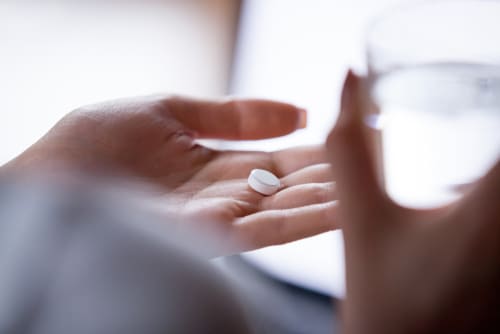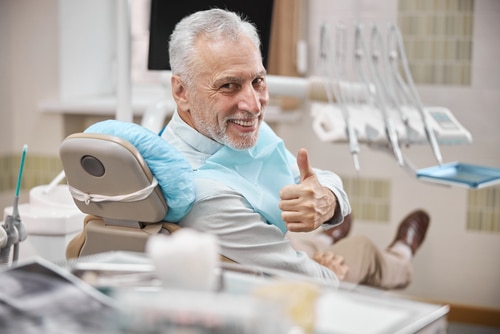Sedation Dentistry in Austin, TX
Dental-related anxiety and fear can prevent you from getting needed treatments that protect your oral health and overall wellness. If you worry about going to the dentist, you’re not alone: Cleveland Clinic estimates that 36% of Americans fear dental procedures, with 12% experiencing severe fear. That’s why we offer sedation dentistry options to help put our patients at ease. In addition to oral sedation, our dentists are board-certified in nitrous oxide sedation.
What Is Sedation Dentistry?
Sedation dentistry is a medical practice that uses medication (sedatives) to help patients stay relaxed and at ease during their dental treatments. It’s especially useful for those with dental anxiety or phobias, allowing them to undergo treatments more comfortably.
Sedation dentistry is helpful for patients who:
- Experience dental fear or anxiety
- Fear needles
- Have a low pain threshold
- Struggle to control their muscles for extended timeframes
- Have a sensitive gag reflex
- Require extensive or lengthy dental procedures
- Prefer to have a more comfortable and relaxed experience during their dental visits
For many procedures, we use local (injectable) anesthesia like lidocaine to numb the treatment area and minimize pain. However, some individuals require additional support. At Aspire Dental, we offer sedation to help you calm down and make it easier to get your needed dental work done.
Types of Sedation
At our practice, we offer conscious sedation for your dental procedures. This means you remain conscious but enjoy a high level of comfort and relaxation during your treatment. We provide various sedation options, such as oral sedation and nitrous oxide, which can be customized to meet your specific requirements, reducing anxiety and ensuring your overall comfort throughout the procedure.
Oral Sedation
Oral conscious sedation involves the administration of a prescription medication in the form of a pill before your procedure. The medication has sedative and anxiety-reducing effects. As a result, it can also make you feel drowsy, and some patients may even doze off during the procedure (although you can be easily awakened).

During the procedure, we monitor you closely to ensure your safety. Once the treatment concludes, your dental work will be completed, and you might not even recall the procedure. That’s because oral conscious sedation can lead to partial or even complete memory loss, which can be especially comforting for individuals with dental anxiety.
However, because you may still feel sleepy after your procedure, you’ll need to have a trusted friend or family member drive you home.
Nitrous Oxide (Laughing Gas)
Nitrous oxide—often called laughing gas or happy gas—is the most used gas anesthetic worldwide. This mild sedative induces feelings of calmness and euphoria, allowing you to relax. It’s commonly used for individuals with mild to moderate dental anxiety and can be easily adjusted to achieve the desired level of relaxation.
It’s administered through a small mask placed over your nose, allowing you to inhale a mixture of nitrous oxide and oxygen. This safe and effective method creates a calm feeling.
Once the procedure is complete, we turn off the nitrous oxide and use oxygen to flush out your system. The effects wear off quickly, allowing you to resume your daily activities without downtime. You can even drive yourself home.
Our Philosophy
We understand that dental anxiety is a concern for many patients. Our goal is for you to have a positive experience at Aspire Dental. We want you to feel empowered to seek routine care to maintain your oral health and prevent complications that require more complex treatment.
Whether you’ve struggled with dental phobia for years or it’s been a while since your last visit, we want your visit to be stress-free. We are committed to helping our patients overcome their dental fears and phobias, transforming apprehensive individuals into regular patients through education, understanding, and gentle care. By offering oral conscious sedation and nitrous oxide (laughing gas), we provide options to enhance your comfort and make your dental appointments more manageable.
The Advantages of Sedation Dentistry
Sedation dentistry offers several advantages for both patients and dentists, making dental procedures more accessible and comfortable. Some of the key advantages include:
- Reduced anxiety: Sedation helps patients with dental phobias, anxieties, or past traumatic experiences feel more relaxed and at ease during their dental appointments. Some forms of sedation even have a short-term amnesia effect, which can reduce anxiety for future appointments.
- Pain management: Sedatives ensure patients don’t experience pain during the procedure. This is especially helpful for those with a low pain tolerance.
- Increased comfort: Patients often feel more comfortable and less aware of the sights, sounds, and sensations associated with dental procedures.
- Suppressed gag reflex: Sedation can make your gag reflex less sensitive, making it easier for the dentist to perform the treatment.
- Time efficiency: Sedation can help patients sit through longer or more complex procedures without discomfort or restlessness. This can result in more efficient treatments.
- More extensive procedures: Sedation allows us to perform multiple dental procedures in one session, reducing the number of appointments you need. For example, we can extract a tooth, place mini dental implants, and mount a crown, bridge, or denture in one visit.
One of the most important benefits of sedation dentistry is that patients who might otherwise avoid necessary dental care due to fear or anxiety can maintain better oral health with sedation options.
The Sedation Process
The sedation dentistry process begins with a consultation during which we will discuss your medical history, previous dental experiences, and the medications you take. This helps us determine whether oral sedation or laughing gas is best suited for your needs.
It’s important to avoid eating or drinking for at least 6 hours before your appointment to minimize the risk of feeling nauseous. If you opt for oral sedation, we’ll ask you to arrive early to administer the medication and let it take effect.
Once you have received the sedative and feel relaxed, we will then apply a local anesthetic. Administering anesthesia in this order helps reduce anxiety for those who fear needles.
Guidelines after your procedure depend on the type of sedation you’ve gotten. If you opt for oral sedation, having someone to drive you home is essential, as the sedative will linger in your system and impair your ability to drive safely. However, with laughing gas sedation, you’ll be able to drive yourself home since the gas is quickly expelled from your system.
Once you’re home, please rest until the sedative has completely worn off. While this occurs quickly for laughing gas, please note that full recovery from oral conscious sedation can take 24 hours. You can eat after the procedure, but we recommend waiting until your mouth is no longer numb from the local anesthesia.
Is Sedation Dentistry Safe?
Yes. Sedation dentistry is generally considered safe when administered by trained and qualified dental professionals like Dr. Hall and Dr. McNeil. Mild sedation options, like oral conscious sedation and laughing gas, are especially safe. While sedation dentistry effectively reduces anxiety surrounding dental work, it may not be best for all individuals. The following factors could make you ineligible for certain types of sedation:
- Allergies or sensitivities: People with allergies or sensitivities to specific sedative medications should avoid sedation with those substances.
- Medical conditions: Individuals with certain medical conditions, such as severe respiratory problems like chronic bronchitis, asthma, or sleep apnea. Additionally, those with high blood pressure or diabetes may not be good candidates for sedation.
- Medication interactions: Some medications may interact adversely with sedatives. That’s why providing us with a complete list of all your medications and supplements is crucial.
- Pregnancy: Sedation is generally not recommended for pregnant women, especially in the first trimester. If dental treatment is necessary during pregnancy, we will consider alternative approaches.
- History of substance abuse: Individuals with a history of substance abuse may need to be cautious with sedation, as they could be at a higher risk of developing dependencies on sedative drugs.
Learn More about Sedation Options at Aspire Dental
At Aspire Dental, your comfort and care are our top priorities. With a dedicated team of experts, we offer sedation dentistry to make your visit anxiety-free and painless. Whether it’s oral conscious sedation or laughing gas, our practice ensures a safe and relaxed atmosphere so you can improve and maintain your oral health. Don’t let fear or discomfort keep you from getting dental care. Contact us today to discuss your sedation needs.
